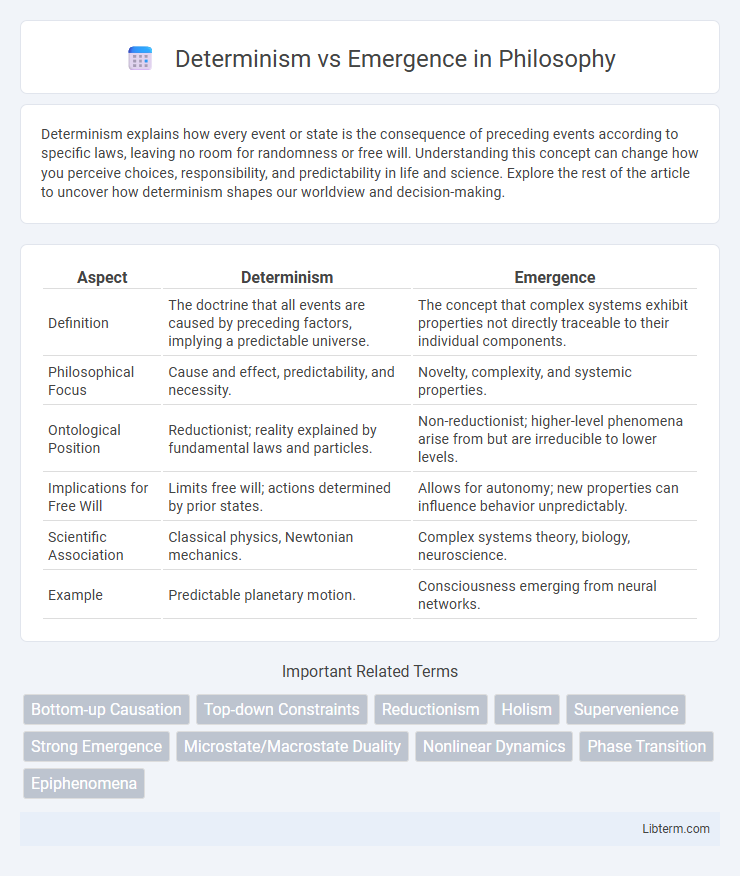Determinism explains how every event or state is the consequence of preceding events according to specific laws, leaving no room for randomness or free will. Understanding this concept can change how you perceive choices, responsibility, and predictability in life and science. Explore the rest of the article to uncover how determinism shapes our worldview and decision-making.
Table of Comparison
| Aspect | Determinism | Emergence |
|---|---|---|
| Definition | The doctrine that all events are caused by preceding factors, implying a predictable universe. | The concept that complex systems exhibit properties not directly traceable to their individual components. |
| Philosophical Focus | Cause and effect, predictability, and necessity. | Novelty, complexity, and systemic properties. |
| Ontological Position | Reductionist; reality explained by fundamental laws and particles. | Non-reductionist; higher-level phenomena arise from but are irreducible to lower levels. |
| Implications for Free Will | Limits free will; actions determined by prior states. | Allows for autonomy; new properties can influence behavior unpredictably. |
| Scientific Association | Classical physics, Newtonian mechanics. | Complex systems theory, biology, neuroscience. |
| Example | Predictable planetary motion. | Consciousness emerging from neural networks. |
Understanding Determinism: Key Concepts and Definitions
Determinism asserts that every event or state is the inevitable result of preceding causes, governed by fixed laws of nature, implying predictability and causal necessity. It relies on key concepts such as causal chains, linearity, and the principle of cause and effect, where each effect has a specific cause. Understanding determinism requires examining the role of initial conditions, physical laws, and the assumption of a closed system where outcomes are predetermined.
Emergence Explained: From Simple Rules to Complex Systems
Emergence arises when simple rules interact locally to produce complex, unpredictable global behaviors in systems such as cellular automata, neural networks, and ecosystems. Unlike determinism, which relies on linear cause-effect chains, emergent phenomena cannot be fully predicted by analyzing individual parts alone, highlighting the role of nonlinear interactions and feedback loops. This principle underlies many complex adaptive systems where order and structure spontaneously develop from decentralized, bottom-up processes.
Historical Perspectives: Determinism and Emergentism in Philosophy
Determinism, rooted in the Enlightenment era, posits that all events are causally determined by preceding states in a predictable chain, exemplified by Laplace's demon concept. Emergentism arose as a philosophical response in the 19th and 20th centuries, emphasizing the novelty of complex systems where higher-level properties cannot be fully reduced to their parts, as illustrated by thinkers like Alexander Bain and C.D. Broad. The historical debate centers on whether the universe operates through strict causal laws or if new, irreducible phenomena genuinely emerge from complexity.
Deterministic Models in Science and Technology
Deterministic models in science and technology rely on precise mathematical formulations to predict system behavior with complete certainty based on initial conditions, as seen in classical mechanics and control systems. These models are foundational in fields like physics, engineering, and computer science, enabling accurate simulations and designs through algorithms that exclude randomness. The predictability of deterministic approaches facilitates optimization and reliability in technological applications, contrasting with the probabilistic nature of emergent phenomena in complex systems.
Emergence in Nature: Biological and Physical Examples
Emergence in nature describes complex patterns arising from simple interactions at lower levels, evident in biological systems like ant colonies, where collective behavior emerges without centralized control. In physical contexts, phenomena such as flocking birds or snowflake formation illustrate how local interactions create organized structures. These examples underscore that emergent properties cannot be fully predicted from understanding individual components alone, highlighting the importance of studying systems holistically.
Comparing Determinism and Emergence: Core Differences
Determinism posits that all events are the inevitable result of preceding causes, emphasizing a predictable and linear cause-effect relationship within systems. Emergence highlights the arising of complex properties and behaviors from simple interactions, which cannot be directly predicted solely by examining individual components. Core differences lie in determinism's focus on preordained outcomes versus emergence's emphasis on novel, often unpredictable system-level patterns.
Can Determinism and Emergence Coexist?
Determinism and emergence can coexist through the perspective of layered causality, where deterministic physical laws govern fundamental components while emergent properties arise at higher levels of complexity. Emergence describes novel, system-wide patterns not predictable solely from initial conditions, yet these patterns evolve from deterministic interactions at micro-levels. This coexistence suggests that while underlying processes are deterministic, emergent phenomena provide new explanatory frameworks for complex systems beyond reductionist approaches.
Implications for Free Will and Human Agency
Determinism posits that all events, including human actions, are causally determined by preceding events, challenging the notion of free will by implying predictable human behavior. Emergence suggests that complex systems, like human consciousness, arise from simpler interactions, enabling novel properties such as autonomous decision-making beyond deterministic constraints. This interplay influences philosophical debates on human agency, with implications for moral responsibility and the understanding of self-directed action.
Debates and Criticisms: Major Viewpoints on the Spectrum
Determinism asserts that every event or state is causally determined by preceding events, emphasizing predictability and fixed laws, while emergence highlights novel properties and behaviors arising from complex systems that cannot be fully explained by their parts alone. Critics of determinism argue it oversimplifies reality by ignoring the unpredictability and novelty found in complex systems, whereas opponents of emergence claim it risks mystifying phenomena that could be reduced to deterministic processes. The debate centers on whether the universe is fundamentally predictable through strict causal chains or whether emergent properties introduce genuine novelty beyond deterministic explanation.
Future Directions: The Role of Determinism and Emergence in Modern Research
Future research increasingly explores the interplay between determinism and emergence to better understand complex systems in fields such as physics, biology, and artificial intelligence. Advances in computational modeling and data analytics enable scientists to identify deterministic patterns within emergent phenomena, bridging gaps between reductionist and holistic approaches. This synthesis promises to enhance predictive accuracy and inform innovative strategies for addressing dynamic, multi-dimensional challenges in technology and natural sciences.
Determinism Infographic

 libterm.com
libterm.com